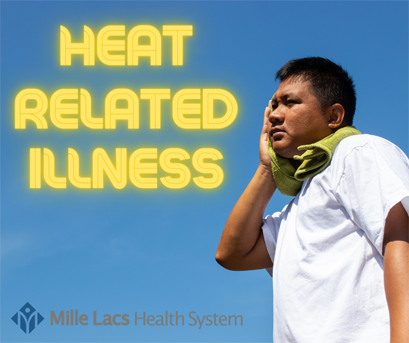Summer heat and your health
July 29, 2022
Summer is a great time to maximize time spent outdoors. The days are long, and the temperatures are warm. These same warm summer days can also offer the risk of heat-related illnesses if precautions are not taken.
Exposure to high temperatures and humidity especially for prolonged amounts of time without relief or adequate fluid intake can lead to one of the three heat-related illnesses: heat cramps, heat exhaustion, and heat stroke.
Heat cramps are the mildest form of heat illness and consist of painful muscle cramps, spasms, and flushed or moist skin that occurs during or after intense exercise and sweating in high heat.
Heat exhaustion is more severe than heat cramps and results from a loss of water and salt in the body. It occurs in extreme heat and excessive sweating without adequate fluid and salt replacement. Heat exhaustion occurs when the body is unable to cool itself properly and, if left untreated, can progress to heat stroke. Symptoms include those of heat cramps, as well as: a fever over 100.4° F, nausea, vomiting, headache, diarrhea, fatigue, weakness, or a faint feeling.
Heat stroke the most severe form of heat illness occurs when the body’s heat-regulating system is overwhelmed by excessive heat. Symptoms can include those from heat cramps and heat exhaustion in addition to: warm/dry skin, rapid heart rate, loss of appetite, confusion, or seizure/coma. Heat stroke is a life-threatening emergency and requires immediate medical attention.
Treatment for any of the heat-related illnesses can include moving to a cool place to rest, fanning the skin, or drinking a cool sports drink containing salt and sugar. In severe cases, remove excess clothing and place cool wet cloths or an ice bag on the head, neck, armpits, and groin areas. IV fluids may also be needed.
Children/teens, the elderly, those working in hot environments, people with high blood pressure, people with poor health, overweight people, and those on certain medications are more susceptible to extremely hot temperatures.
When spending time outdoors in the summer, practice these things to help prevent heat illness.
Drink plenty of fluids during vigorous or outdoor activities, avoid alcohol and fluids with caffeine, rest often, dress in light-colored/lightweight clothing, and wear a hat, sunglasses, and sunscreen.
